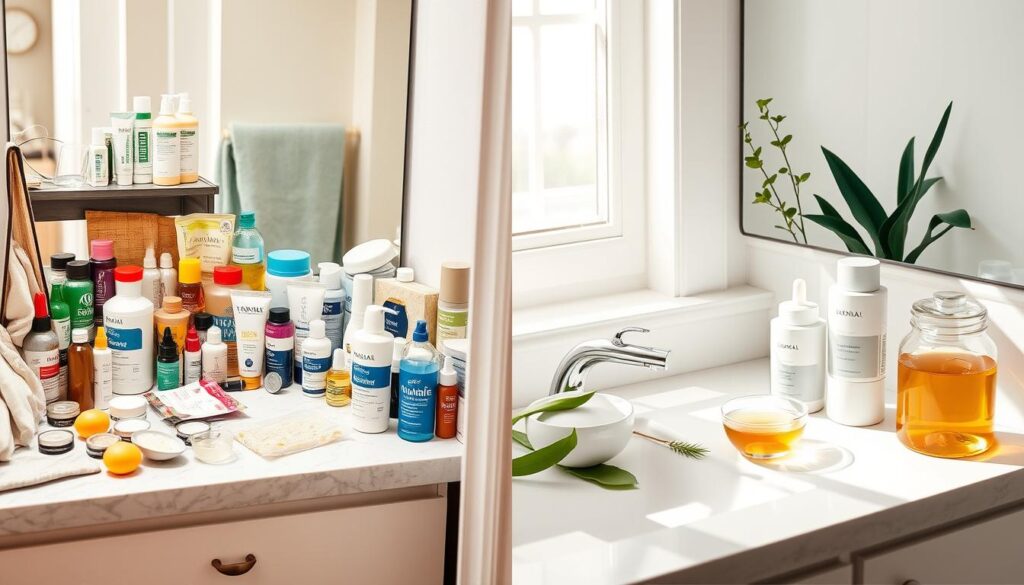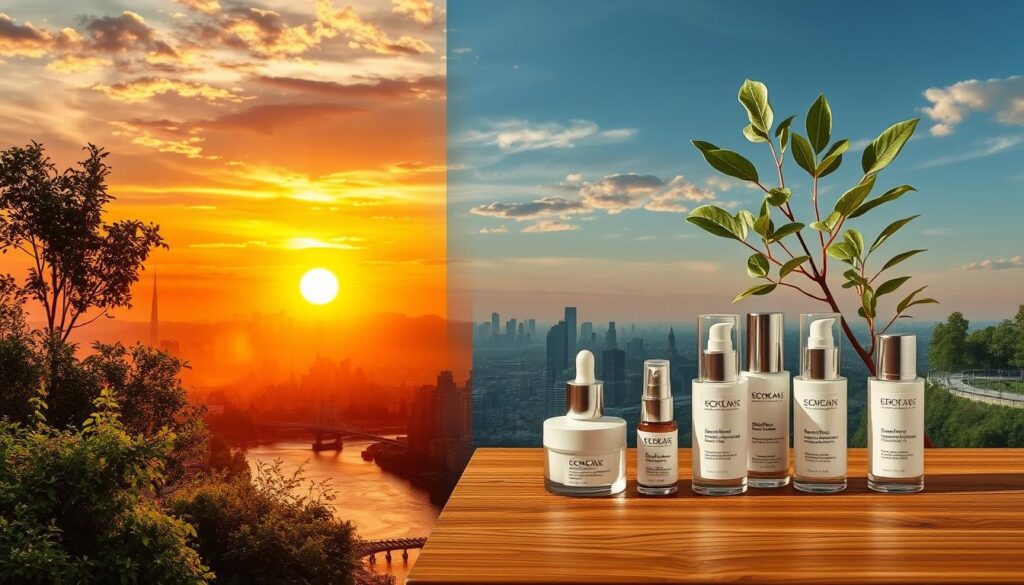In the ever-evolving world of skincare, it’s easy to get lost in a maze of myths, misconceptions, and unfounded claims. As we strive to achieve healthy, glowing skin, it’s crucial to separate fact from fiction and rely on expert insights. In this article, we’ll explore five common skincare myths and uncover the truth behind them, armed with the guidance of leading dermatologists.
Key Takeaways
- Skincare myths can lead to ineffective or even harmful practices, so it’s important to rely on evidence-based information.
- Experts provide valuable insights to debunk common misconceptions and help us make informed decisions about our skincare routines.
- Understanding the truth behind popular skincare beliefs can empower us to adopt more effective and healthier skin care practices.
- Separating fact from fiction in the skincare industry is crucial for achieving optimal skin health and avoiding potential pitfalls.
- This article aims to equip readers with the knowledge they need to navigate the complex world of skincare with confidence.
Understanding Common Skincare Misconceptions in Modern Beauty
When it comes to skincare, the landscape is often clouded by misconceptions and misinformation. As the Skincare Industry Insights continue to evolve, it’s crucial to separate fact from fiction and understand the true drivers behind our skincare beliefs. In this section, we’ll explore how marketing strategies and social media have shaped our perceptions of Healthy Skin Tips and uncover the realities that lie beneath the surface.
How Marketing Shapes Our Skincare Beliefs
The skincare industry is a thriving business, and marketers know how to capture our attention. From exaggerated claims to strategic product placement, marketing techniques can significantly influence our skincare decisions. We must be mindful of the persuasive tactics employed and question the underlying motives behind the messages we’re exposed to.
The Role of Social Media in Spreading Myths
In the digital age, social media has become a powerful platform for sharing information, both factual and fictitious. Influencers, bloggers, and even well-intentioned users can inadvertently propagate skincare myths, leading to a widespread acceptance of these beliefs. It’s essential to approach social media content with a critical eye and seek out authoritative sources when making informed Healthy Skin Tips decisions.
By understanding the forces that shape our skincare beliefs, we can make more informed decisions and adopt a more discerning approach to the Skincare Industry Insights. It’s time to challenge the status quo, question the narratives, and uncover the truth about Healthy Skin Tips.
The Truth Behind Natural vs. Synthetic Ingredients
When it comes to Natural Skincare Solutions, the debate between natural and synthetic ingredients is a long-standing one. Skincare Facts suggest that both types of ingredients have their own unique benefits and drawbacks, and it’s essential for consumers to understand the truth behind these differences.
Natural ingredients, such as plant extracts, essential oils, and minerals, are often touted as the safer and more eco-friendly choice. However, it’s important to note that natural doesn’t always mean better. Some natural ingredients can be just as potent and potentially irritating as their synthetic counterparts. Additionally, the efficacy of natural ingredients can vary widely due to factors like sourcing, processing, and concentration.
On the other hand, synthetic ingredients are often criticized for being harsh or harmful, but many modern synthetic compounds are designed to be gentle, non-irritating, and highly effective. These ingredients can be precisely formulated to target specific skin concerns, providing consistent and predictable results.
Ultimately, the key is to look beyond the natural vs. synthetic labels and focus on the individual ingredients, their quality, and how they interact with your skin. As Skincare Facts suggest, it’s essential to consult with a dermatologist or trusted skincare professional to understand the best approach for your unique skin type and needs.
By understanding the truth behind Natural Skincare Solutions and being an informed consumer, you can make more informed choices and find the best products to support the health and appearance of your skin.
Skincare Myths, Expert Advice: What Dermatologists Really Think
When it comes to skincare, separating fact from fiction can be a real challenge. With a constant barrage of marketing claims and social media trends, it’s no wonder many of us struggle to distinguish Dermatologist Recommendations from mere Skincare Facts. Fortunately, we can turn to the experts – the dermatologists themselves – to get the real scoop on common skincare myths.
Clinical Evidence vs. Popular Beliefs
Dermatologists have access to a wealth of scientific research and clinical data that often contradicts the popular beliefs circulating online and in the media. For instance, many people believe that expensive, high-end skincare products are inherently more effective than their more affordable counterparts. However, dermatologists often emphasize that the quality of ingredients, not the price tag, is what truly matters.
Professional Insights on Skincare Routines
- Dermatologists stress the importance of a consistent, gentle skincare routine over using a multitude of products.
- They caution against over-exfoliating, which can disrupt the skin’s natural protective barrier.
- Dermatologists recommend focusing on hydration and sun protection as the cornerstones of any effective skincare regimen.
By heeding the advice of these skincare experts, we can make more informed decisions about our routines and avoid falling prey to the latest skincare myths. After all, when it comes to the health and beauty of our skin, it pays to listen to those who know it best.
Debunking Age-Old Beliefs About Anti-Aging Products
When it comes to anti-aging skincare, many misconceptions and myths have circulated for decades. In this section, we’ll dive deep into some of the most prevalent beliefs and uncover the truth behind them. By separating fact from fiction, we can empower you to make informed decisions about your Anti-Aging Skincare routine.
One of the most common Skincare Myths is the idea that expensive anti-aging products are inherently more effective than their more affordable counterparts. However, research has shown that the price tag does not always correlate with the product’s efficacy. Sometimes, the key ingredients that make a difference in combating signs of aging can be found in more budget-friendly options.
Another widespread myth is the belief that natural ingredients are always superior to synthetic ones when it comes to anti-aging benefits. While natural ingredients can be beneficial, modern technology has also produced potent synthetic alternatives that can be equally, if not more, effective in addressing fine lines, wrinkles, and other age-related skin concerns.
Additionally, many people believe that anti-aging products can completely reverse the aging process. Unfortunately, this is not the case. While these products can certainly help mitigate the appearance of aging, they cannot turn back the clock completely. Realistic expectations and a balanced approach are key when incorporating anti-aging skincare into your routine.
By acknowledging and addressing these Skincare Myths, we can empower you to make more informed choices about your Anti-Aging Skincare regimen. Remember, the most effective anti-aging strategies often involve a combination of high-quality products, a healthy lifestyle, and realistic expectations.
The Science of Skin Hydration: Facts vs. Fiction
Proper skin hydration is the foundation of a healthy, radiant complexion. Yet, there are numerous myths and misconceptions surrounding this critical aspect of Healthy Skin Tips. Let’s dive into the science behind skin hydration and uncover the facts that can transform your Skincare Facts routine.
Understanding Your Skin’s Moisture Barrier
The skin’s moisture barrier plays a crucial role in maintaining optimal hydration levels. This protective layer, composed of lipids and natural oils, helps lock in moisture and prevent water loss. When the moisture barrier is compromised, the skin becomes dry, dehydrated, and more susceptible to environmental stressors.
Hydration Myths That Need to Stop
Many common beliefs about skin hydration are simply not supported by scientific evidence. For example:
- Myth: Drinking more water will immediately improve skin hydration. Fact: While staying hydrated is important, the skin’s ability to absorb and retain moisture goes beyond just water intake.
- Myth: Expensive, high-end moisturizers are the key to hydrated skin. Fact: The effectiveness of a moisturizer depends on its formulation, not its price tag.
- Myth: Harsh, alcohol-based products are necessary for deep cleansing. Fact: These products can actually disrupt the skin’s moisture barrier, leading to dryness and irritation.
By understanding the true science behind skin hydration, you can unlock the secrets to maintaining a healthy,
Breaking Down Acne Treatment Misconceptions
When it comes to treating acne, there are many myths and misconceptions that can hinder our efforts to achieve clear, healthy skin. As skincare enthusiasts, it’s essential to separate fact from fiction and explore the latest research-backed approaches to managing this common skin concern.
One of the prevailing Acne Treatment Myths is that aggressive scrubbing and harsh cleansers are the best way to combat breakouts. In reality, over-cleansing can disrupt the skin’s delicate balance, leading to increased inflammation and even more acne. Dermatologists recommend gentle, non-irritating cleansers that won’t strip the skin of its natural oils.
Another Skincare Myth is that toothpaste is an effective spot treatment for pimples. While this may provide a temporary drying effect, the abrasive ingredients in toothpaste can cause further irritation and damage to the skin. Experts advise using dedicated acne-fighting products containing salicylic acid or benzoyl peroxide instead.

It’s also widely believed that acne is solely caused by poor hygiene or a dirty face. In reality, the root causes of acne are complex and often tied to hormonal imbalances, genetics, and other underlying factors. Proper cleansing and skincare routines are important, but they are just one piece of the puzzle when it comes to managing acne effectively.
By addressing these common Acne Treatment Myths and Skincare Myths, we can take a more holistic and evidence-based approach to achieving clear, radiant skin. Remember, the key to successful acne treatment lies in working closely with a dermatologist and following their personalized recommendations.
The Reality of Product Price vs. Effectiveness
When it comes to the Skincare Industry Insights, the relationship between product price and effectiveness is a topic that often sparks debate. As consumers, we’re bombarded with messages about the latest skincare must-haves, each promising miraculous results. But what are we really paying for, and does a higher price tag always equate to better Expert Advice? Let’s dive in and explore the reality behind this common skincare myth.
What You’re Really Paying For
The truth is, a product’s price is influenced by a variety of factors, not just its efficacy. Factors such as brand recognition, packaging, marketing, and even celebrity endorsements can significantly impact the final cost. While these elements may contribute to a product’s perceived value, they don’t necessarily translate to superior results.
Investment vs. Results in Skincare
When it comes to Skincare Industry Insights, the key is to focus on the performance and quality of the ingredients, not the price tag. Sometimes, more affordable options can be just as effective, if not more so, than their high-end counterparts. The best approach is to research and consult with Expert Advice to find products that cater to your specific skin needs, regardless of the price point.
Remember, the ultimate goal is to achieve healthy, radiant skin, not to break the bank. By understanding the factors that influence product pricing, you can make informed decisions and invest your money wisely in your Skincare Industry Insights.
How Environmental Factors Impact Your Skincare Routine
Our skin is constantly exposed to various environmental factors that can significantly impact its health and well-being. From the scorching sun to the harsh winter winds, the conditions we encounter daily can either nourish or damage our complexion. As Healthy Skin Tips and Skincare Facts enthusiasts, it’s crucial to understand how these environmental stressors affect our skin and adapt our routines accordingly.
One of the most prominent environmental factors is UV radiation. Excessive sun exposure can lead to premature aging, sun damage, and an increased risk of skin cancer. To combat this, we recommend incorporating a broad-spectrum sunscreen into your daily Skincare Facts regimen, regardless of the season. Reapplying sunscreen throughout the day is also essential for maintaining Healthy Skin Tips.
- Protect your skin from harmful UV rays by using a broad-spectrum sunscreen with an SPF of 30 or higher.
- Reapply sunscreen every 2 hours, or more frequently if swimming or sweating.
- Seek shade, wear protective clothing, and avoid direct sun exposure during peak hours.
Pollution is another environmental factor that can negatively impact skin health. Airborne pollutants, such as particulate matter and chemicals, can clog pores, cause inflammation, and accelerate skin aging. To mitigate the effects of pollution, consider incorporating antioxidant-rich products into your Skincare Facts routine to neutralize free radicals and support skin barrier function.

Lastly, climate changes and seasonal variations can also influence our skin’s needs. For example, dry, cold winters may require a heavier moisturizer, while humid summers may call for a lightweight, oil-free formula. By adjusting your Healthy Skin Tips routine based on the prevailing environmental conditions, you can ensure your skin remains healthy and radiant throughout the year.
Conclusion
In our exploration of common skincare myths and expert advice, we’ve uncovered a wealth of insights that challenge the misconceptions often propagated by marketing and social media. From the truth behind natural vs. synthetic ingredients to the realities of anti-aging products and acne treatments, we’ve delved into the science and expertise that should guide our skincare practices.
As we bid farewell, we encourage you to approach your skincare routine with a critical and informed mindset. Remember, Debunking Skincare Misconceptions and heeding Expert Advice are the keys to achieving the healthy, glowing skin you desire. Trust the evidence-based guidance of dermatologists and skincare professionals, and be wary of the often misleading claims perpetuated by marketing and social influencers.
Embracing a well-rounded, evidence-based approach to skincare is the surest path to unlocking your skin’s true potential. By staying informed and making informed choices, you can navigate the ever-evolving landscape of modern beauty with confidence, ultimately achieving the healthiest, most radiant complexion.



